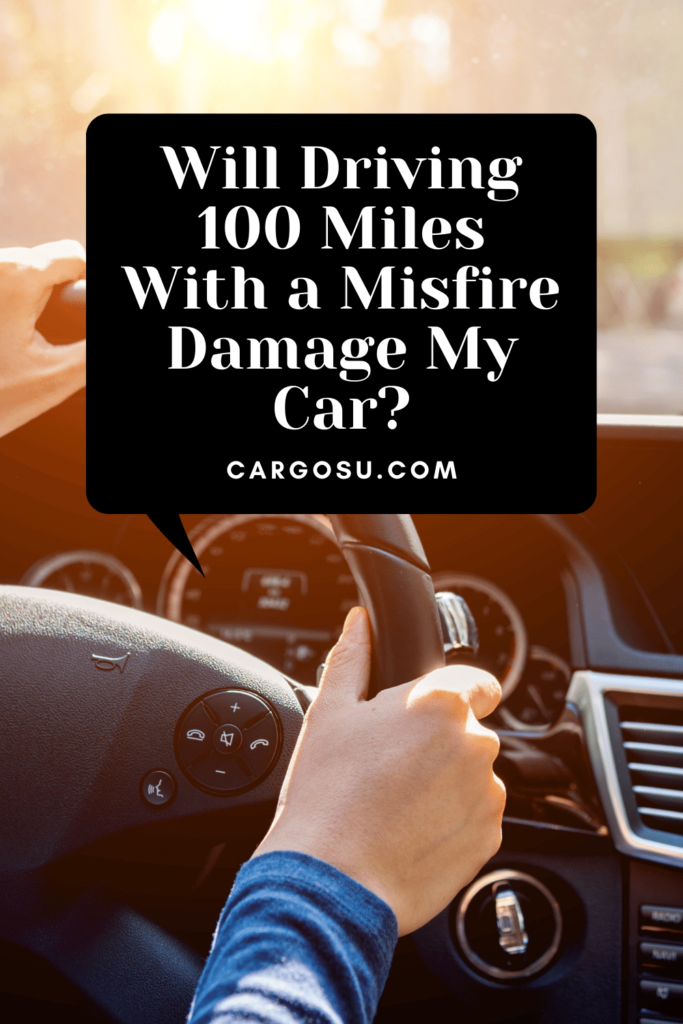A misfire is an indication that there is something wrong with your engine.
It could be something relatively minor like a loose sparkplug lead or it could be an indication of a much bigger problem such as a blown head gasket.
The longer you drive your car in this condition, the greater the problem could become. So, it is best if you get the problem investigated as soon as possible.
Table of Contents
Will Driving 100 Miles With a Misfire Damage My Car?
By driving 100 miles with a misfire, you’ll damage your car’s engine. Under normal circumstances, driving for a short distance with a misfire will not badly damage your car. But it can lead to excess wear and tear on the engine bearings, gearbox, and drivetrain. It’s also a potential fire hazard.

Car Misfire
However, a misfire indicates that there is a problem with one or more cylinders in the engine. And when the cylinder misfires, instead of the petrol or diesel igniting and being exhausted as burned carbon and gases, the flammable liquid is pushed into your exhaust.
As your exhaust pipe is extremely hot, it is most likely that the unburned fuel will ignite and produce the characteristic explosive bang, together with some black smoke exiting your tailpipe.
On older vehicles without catalytic converters, this was a relatively harmless event. Unless, of course, your exhaust pipe was rusted, in which case, you’d probably blow a hole in your exhaust with your car ending up sounding like a tractor.
Catalytic Converters
With modern engines, a misfire can become a major fire problem.
Instead of the burnt fuel being burnt and exhausted out of the tailpipe, it gets caught in the catalytic converter and the converter then does what it is designed to do and attempts to burn all the excess fuel.
This leads to the exhaust and catalytic converter becoming extremely hot. The temperatures can reach far in excess of the normal safe range, causing charring of the underneath of the vehicle as well as potentially igniting carpets and other material inside the vehicle.
To avoid more costly engine repairs or a potentially catastrophic event, here are some of the more common reasons you’ll experience a misfire.
A Sparkplug Problem
If your spark plug lead is loose or the sparkplug has worn out, you may find that the misfire starts to appear intermittently and gets worse over time. Often a sparkplug lead wears out and needs replacement.
An Oil Leak
If you have too much oil reaching the cylinder, it will coat the sparkplug causing it to not produce a spark. Over time, the sparkplug becomes burned out due to the excessive oil deposits.
Incorrect Fuel Mixture
If your fuel to air mixture is too lean or too rich, it won’t combust properly. Too much fuel will leave the sparkplug wet with fuel, while too little fuel will result in the sparkplug burning white. You’ll find that if the ignition timing is out, you’ll also fail to get proper combustion.
Timing Out of Sync
This may be an indication of a timing belt failure which could potentially ruin your engine. You can check your sparkplugs to see if they have blisters, which is an indication of the sparkplug overheating due to a too-lean fuel mixture.
Vacuum Leak
If you have a vacuum leak, the engine will run with a rough idle, surge and stall at low speeds, and then misfire.
Loss of Compression
If the cylinder loses compression due to a blown gasket or the failure of the piston compression rings, the engine will misfire and potentially damage the internal components of the engine.
Fuel System Problems
If your engine is not receiving the correct amount of fuel, it will misfire. You may find that the fuel filters are blocked or there may be a blockage in the fuel tank’s breather valve.
As the fuel leaves the tank, the breather valve acts as a vent to allow air into the tank to equalize the pressure. If the valve becomes blocked, the fuel tank develops a vacuum that prevents the fuel from flowing in the carburetor or fuel injectors.
Left to its own devices, the engine will eventually stall and you could damage your fuel pump.
Misfire Symptoms
When your vehicle misfires, it burns less than the optimum amount of fuel for the throttle position. This means that you’ll lose momentum and have to compensate by pushing down harder on your accelerator.
This results in higher gas consumption accompanied by a worsening performance. You’re also likely to hear loud rattling noises from the engine bay as the engine tries to counteract the effects of the dead cylinder.
While a stalled engine may not be badly damaged, losing power at an inconvenient time can leave you vulnerable to an accident. This is why driving with a misfire for an extended time is not recommended.
Apart from the excessive vibrations and loud backfires, the threat of fire from your catalytic converter should dissuade you from driving a long distance when the engine misfires.
The engine check light on the dashboard will also be a constant reminder that the engine should be fixed.
Frequently Asked Questions About Will Driving 100 Miles With a Misfire Damage My Car
Can a Misfire Go Away on Its Own?
It is unlikely that a misfire will spontaneously correct itself. It is more likely that the problem will get worse with time and lead to more damage to the engine.
Will Changing Spark Plugs Fix a Misfire?
If the spark plugs are old or worn out, then it is possible that changing them will solve the misfire.
Will a Misfire Always Throw a Code?
Misfires will not always trigger a code. When a code is triggered, it will either be a random misfire or a multiple cylinder misfire.
Conclusion On Will Driving 100 Miles With a Misfire Damage My Car
While a misfire can be quickly fixed and may not cause immediate damage, it may be indicative of more serious problems.
Driving for an extended distance can potentially result in a damaged catalytic converter or a fire, so it is not a good idea to drive for longer than you absolutely have to before getting it diagnosed and fixed.

